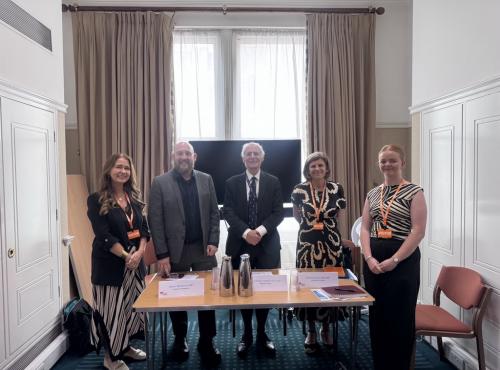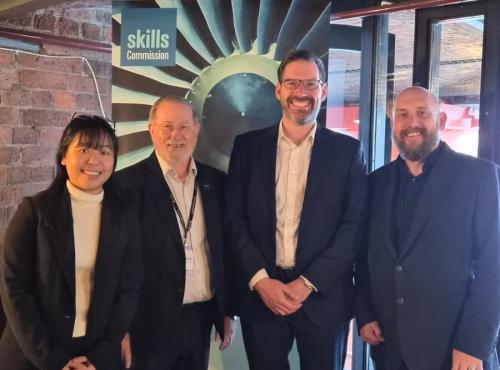Digitally enhanced blended learning: leveraging the benefits of technology in Higher Education
Digitally enhanced blended learning can improve access to higher education and better prepare Britain’s future workforce.
Blended learning has become the sector standard in higher education, offering a more personalised learning experience designed to meet the evolving demands of the digital age.
Cross-party think tank Policy Connect’s latest report, ‘Digitally Enhanced Blended Learning: Leveraging the Benefits of Technology in Higher Education’, led by Lord Norton of Louth and Professor Kathryn Mitchell CBE, DL, sets out how blended learning can widen participation, enhance student outcomes, and modernise educational delivery.
Nationwide lockdowns necessitated a swift and unprepared pivot to online delivery, with higher education institutions (HEIs) compelled to transform and reimagine blended learning practice. In the ever-evolving landscape of higher education, HEIs are now seeking to adopt long-term strategies for advancing digital components of learning and teaching that embrace the affordances of digital technology.
Whilst the HE sector has displayed adaptability in managing the challenges and opportunities of the digital age, it has yet to fully seize the transformative potential of digital technologies. Inadequate guidance on what constitutes a high quality Edtech product has produced continued procurement challenges, and HEIs have demonstrated inconsistency in efforts to modernise curriculum, assessment, and learning design.
The report, following an inquiry by the Higher Education Commission, presents a holistic approach for the successful implementation of digitally enhanced blended learning. It sets out twelve recommendations to refine and elevate current approaches, covering the following important themes:
-
The importance of leadership and strategic oversight.
-
Digital capabilities of staff and provision of support.
-
Equitable access to technology for learning and student experience.
-
Employability for the modern workforce.
-
Use and procurement of educational technology.
-
Regulation and quality assurance of emerging practice.
Chair, Higher Education Commission, Lord Philip Norton of Louth:
“The Higher Education Commission has regularly championed the cause of blended learning, and I am pleased that we have now produced an extensive overview of how an increasingly digital world is impacting higher education. With courses now frequently combining in-person and digitally enabled forms of teaching and assessment, this report is a timely explainer of the challenges and opportunities that blended learning presents.
In a time of rapid technological change, it is a national imperative that students can cultivate the digital skills and capabilities required to succeed in modern industries. As Chair of the Commission, I will continue to urge the Government to address the financial, practical, and operational challenges that institutions face, thereby safeguarding our nation’s greatest assets as we prepare the workforce of tomorrow.”
Co-chair, Higher Education Commission, Professor Kathryn Mitchell CBE, DL:
“As both the co-chair of this inquiry and Vice-Chancellor of the University of Derby, I am delighted that the Higher Education Commission has produced a comprehensive overview of the state of blended learning in higher education. This report and its recommendations highlight the challenges and opportunities of blended learning and demonstrate the critical importance of stakeholder collaboration to ensure all students can leverage the benefits of technology.
Whilst the ‘shift to online’ presented challenges for higher education institutions, it is clear that blended learning provides novel opportunities to increase access to and success for all students across the sector. As this report outlines, blended learning is now the sector standard, and we must work to ensure it positively transforms access, opportunity, and learning outcomes.
If government, university leaders and stakeholder organisations are prepared to make effective delivery of blended learning a personal and institutional priority, we can produce an innovative and supportive ecosystem that enables universities to leverage blended learning to greatest effect for our students.”
Report Author and Education and Skills Researcher, Alyson Hwang:
“Digitally Enhanced Blended Learning underscores the transformative power of blended learning in widening access to higher education and equipping graduates with the essential digital skills needed for the modern workforce.
By integrating technology with traditional learning methods, higher education institutions not only become more accessible but also ensure that graduates are well-prepared to thrive in a rapidly evolving job market. This approach is crucial for fostering a resilient educational environment that can adapt to future challenges and opportunities.
Throughout this inquiry, we found overwhelming positivity towards blended learning and its potential to revolutionise teaching and learning. The report celebrates many of the innovative practices and approaches to blended learning from across the UK, highlighting the great work that is already happening. Stakeholders must now work in concert to ensure that technology-enabled learning can fully realise its affordances, particularly thinking about the ‘digitally-enhanced’ aspect of blended provision.”
Notes to Editors
For further information about this report, please contact Vic, victoria.zeybrandt [at] policyconnect.org.uk (Victoria[dot]Zeybrandt[at]policyconnect[dot]org[dot]uk)
This report was kindly sponsored by ACCA and Jisc.
About Policy Connect
Policy Connect is a cross-party think tank. We specialise in supporting parliamentary groups, forums and commissions, delivering impactful policy research and event programmes and bringing together parliamentarians and government in collaboration with academia, business and civil society to help shape public policy in Westminster and Whitehall, so as to improve people’s lives.
Our work focusses on five key policy areas which are: Education & Skills; Industry, Technology & Innovation; Sustainability; Health; and Assistive & Accessible Technology.
We are a social enterprise and are funded by a combination of regular annual membership subscriptions and time-limited sponsorships. We are proud to be a Disability Confident and London Living Wage employer, and a member of Social Enterprise UK.
About the Higher Education Commission
Policy Connect’s Education and Skills team run the Higher Education Commission. The Commission is made up of leaders from the education sector, the business community, and the major political parties. Established in response to demand from Parliamentarians for a more informed and reflective discourse on higher education policy; the Commission examines higher education policy, holds evidence-based inquiries and produces written reports with recommendations for policymakers.
The Commission is chaired by Professor Lord Norton of Louth, a Conservative peer and academic, and is generously supported by the University Partnerships Programme, ACCA, and Jisc.




